Medical experts call for new concussion rules for junior players
Medical experts have joined forces to call for a radical change to concussion rules in junior sports after a dramatic rise in the number of young players suffering head knocks.
NSW
Don't miss out on the headlines from NSW. Followed categories will be added to My News.
Teenagers would be restricted to one footy match a week and banned from playing for two weeks after a concussion under radical new regulations to protect young brains.
Medical experts say head-knock rules for young athletes had to be changed after an alarming rise in concussions in junior sporting ranks.
The Sunday Telegraph and medical experts today begin a campaign for greater protection and treatment of children who take head knocks, including preventing teenagers playing more than one game of contact sport per week.
Research in the British Medical Journal shows that concussion in adolescents takes longer to recover from than in adults, while a 2015 federal government report into the mental health of children and adolescents found evidence that teens with depression can have the condition exacerbated by blows to the head.

The Australian Institute of Sport has released guidelines calling for teenagers with concussion to be treated more cautiously than professional footballers given their brains are still developing.
Top Sydney sports doctor — and former NSW Waratah — Luke Inman also wants greater communication between sports after seeing one youngster who had suffered seven concussions in 13 months before seeking medical attention.
The key expert recommendations for concussed under-18s include:
MORE FROM JAMIE PANDARAM
Boxing rocked after top fighter dies in training
NRL loses teenage superstar to rugby
Many talented and active teens play multiple codes, generally rugby union and league, on back-to-back days in the weekends, as well as midweek school or representative matches.
Dr Inman said this greatly enhances the risk of concussion and children returning too soon after hits, because the codes do not communicate with each other.
“My recommendation is to play just one contact game a week — the more contact sport you play, the more risk you have of suffering a concussion, so it is about minimising the risk,” Dr Inman told The Sunday Telegraph.
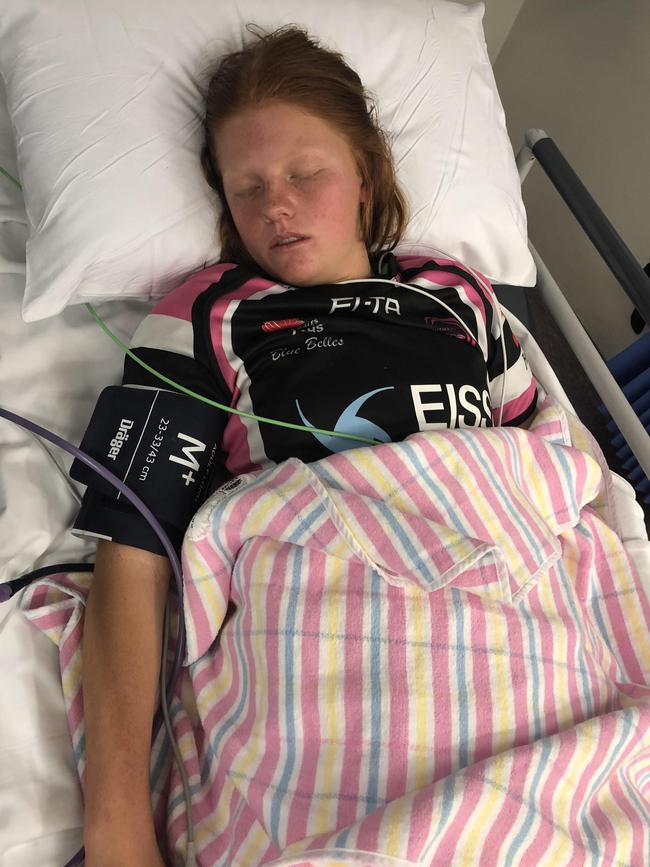
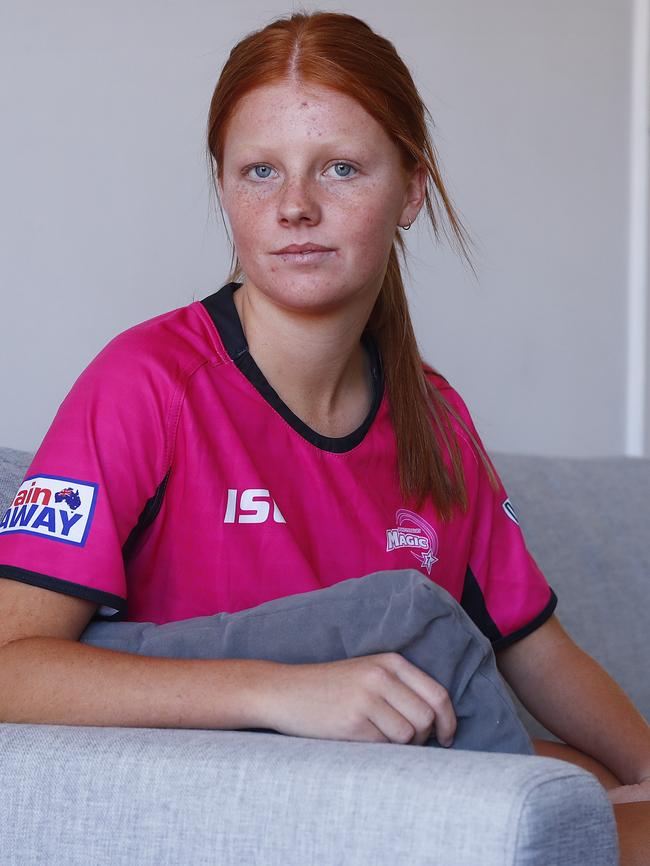
Chloe Lewis remembers very little about August 18 last year.
While attempting a tackle playing for Maroubra Magic in a Rugby Sevens match, then 14-year-old Chloe took a heavy blow to the head that led to months of headaches and memory loss.
“I didn’t really realise how serious it was until the doctors started telling me how it could affect me in the future, if I were to get concussed again I could have memory loss and headaches more frequently,” Chloe said.
“It was quite annoying, in class I would have to close my eyes for a couple of minutes to stop the headaches coming on. I’d forget things and then it would come back to me later.”
Chloe’s dad Murray was on the sidelines in Malabar when she was concussed.
“She was floating in and out of consciousness, I had to hold my hand across her chest as I was driving to the hospital because she kept flopping over,” Mr Lewis said.
“I took her to the Prince of Wales Hospital and the staff were incredible. We were fourth in the queue but the lady behind the desk asked if Chloe had a head injury and when I said ‘Yes’ there was a wheelchair and a bed there within seconds.
“The doctors monitored her every hour throughout the night, her eyes were glazed over and it was midday and she didn’t get clarity back until 10pm.”
After being cleared of a brain bleed, Chloe was discharged the next morning – she had no recollection of speaking to her doctor the previous day – and was advised not to do any contact sport for at least six weeks.
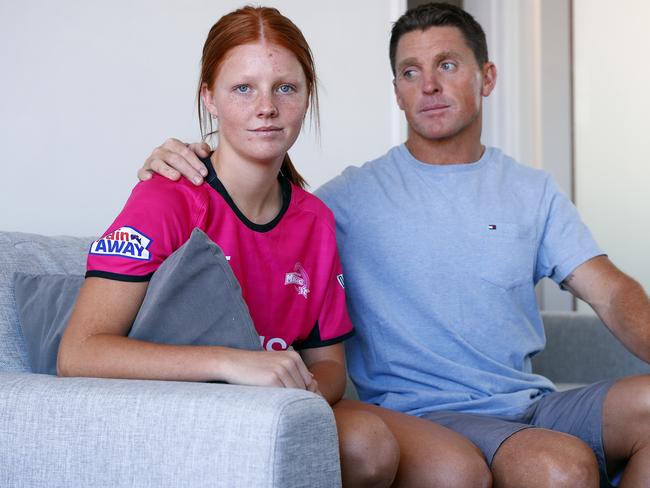
However, the continuing side effects for three months meant she missed this entire season of rugby.
“You have to listen to the doctors, and go back when they say it’s OK,” Chloe, now 16, said.
“At times it was frustrating watching my friends play, but the season has ended now so I’ll have to wait until next February.
“I did feel scared to play at first but now I’m ready to go back.”
Chloe advised teenagers who suffer concussion to strictly follow doctors’ orders and also rest.
“I found sleeping really helped me deal with the headaches,” she said.
The mother of a 14-year-old footballer who suffered seven concussions in just over a year said rugby league needs to learn from rugby union when it comes to duty of care with young players who sustain head knocks.
“I just wish the league people would be a bit more responsible with the kids coming off the field and having more qualified medical people and physios at each club,” Helen (not her real name) said.
She has spoken to The Sunday Telegraph because of concerns about what she has witnessed in the junior levels of both codes.
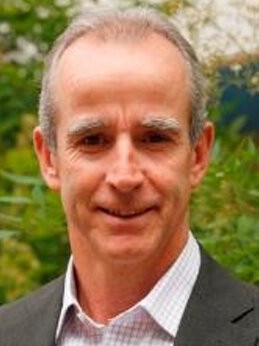
Her son James (not his real name) played both league and union before concentrating on union last season, representing his club team and his school.
“This year with union has been so much better. I think the care factor is a lot more from the school and the union clubs,” she said.
“The school has a physio that travels with the team and they have doctors,” she said.
The school physio put the family in touch with sports physician Dr Luke Inman, who has been treating James and had him undergo a series of tests before he was allowed to return to the field.
Dr Inman also referred James to neuropsychologist Dr Andrew Gardner, a world-leading sports concussion specialist and member of Rugby Australia’s Concussion Advisory Board.
James played league with his local club for seven years, was a part of a representative squad and really enjoyed it.
‘‘But he would have a concussion, they would send him off for a bit and he says, ‘I am feeling good’ and (he would) go back on. It’s disappointing.”
Helen wants league to enforce the same rules and procedures as union.
“Because league just don’t do that, there is no follow-up,” she said.
AIS chief medical officer, Dr David Hughes, has sobering advice for teenagers who attempt to return to playing while still suffering symptoms of concussion.
“The fact is you’re not OK, we know your brain is not operating normally, if you play with concussion your performance will be impaired, your general function and reaction time will be impaired such that you will be more predisposed to having a further injury,” Dr Hughes said.
“Forget concussion, you’ll be at greater risk of other injuries, musculoskeletal injuries, because you’ll be slightly impaired.
“We certainly are also concerned that we often see in adolescents their mood becomes flat, and we know in this group there are risks to mental health anyway.
“One of the things we do ask is ‘Do you have any past history of anxiety or depression?’
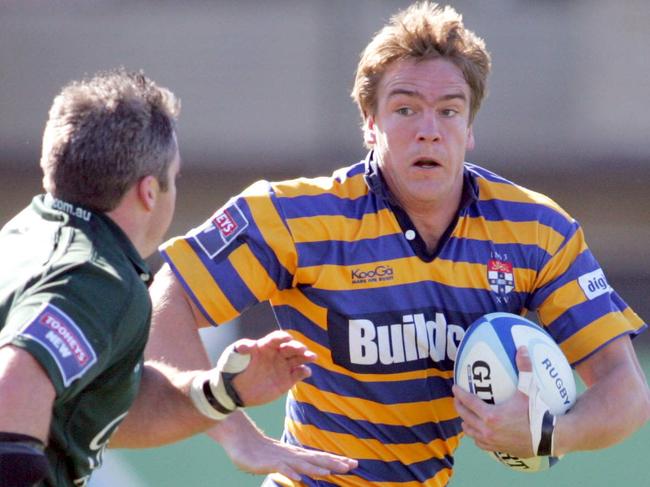
“They’re red flags for us when someone has had a concussion because there’s evidence that concussion affects mood, and those who’ve had a previous history of mental health issues can be more susceptible to having a prolonged recovery or a worsening or exacerbation of their mental health issues,” he said.
While all of the major football codes have started implementing more stringent concussion guidelines amid scientific revelations of long-term health issues associated with head knocks — including memory loss and depression among retired athletes — the AIS believes teens should be treated with even more caution.
“The group of adolescents, from 14 to 18 years, seem to be particularly at risk of having prolonged recovery, so most guidelines around the world will recommend that you be more cautious with return to play with adolescents,” Dr Hughes said.
“In the Concussion In Sport Australia guidelines we’re quite specific in that we recommend people aged 18 years and under be given longer to recover, we suggest they should be symptom-free for 14 days. The reason we say symptom-free is that every concussion is different.
“Some children will be concussed and feel fine the next day, they could go back to contact 14 days after that.
“But if a child is still feeling symptoms for three weeks afterwards, we wouldn’t say they can go back in three weeks and one day.
“We say they need to be feeling themselves for 14 days after that, so that would be five weeks after the concussion. The vast majority who suffer concussion will recover and go on to lead healthy, normal lives. However, in a sports setting we’re very conscious that if something happens and the child is not themselves, we want parents, teachers, coaches, everybody to be aware of when they should be suspicious of concussion.”
